Welcome to the week. Here are the most notable stories our writers and readers have come across in the past seven days…
This week’s Roundup is brought to you by Gorges Beer Co., who reminds you to swing by Bike Happy Hour every Wednesday from 3-6:00 pm on their patio overlooking the SE Ankeny Rainbow Road plaza (at 28th). Special guests this week will be members of the PBOT Bicycle Advisory Committee!
And now, let the Roundup begin…
Kids are leading the way: Child-centered street safety movements like bike buses, kidical mass and school streets are sweeping across Europe (and the U.S.!) in what is the most hopeful and exciting wave of activism in many years. (The Conversation)
Consume less: With all the excitement around electric cars and buses and trucks, we need to hear transportation officials talk a lot more about consuming less energy overall. (The Intercept)
Hungry for batteries: A national nonprofit has launched a new campaign (with an adorable mascot named “Watts”) that encourage e-bike riders to recycle their batteries. (People for Bikes)
Arrested mobility: Urban planner and author Charles Brown understands the myriad ways we interpret and enforce laws around human movement and how that enforcement is a reflection of a systemic bias against Black, brown and other people of color. (War on Cars Podcast)
Charge those drivers: Great news from New York City where the Federal Highway Administration has just blessed their plan to become the first place in America to institute a congestion pricing plan. Let’s hope the idea spreads! (Curbed)
Influencers: TikTok and Instagram are allowing new voices to reach new audiences and educate folks about urban planning and transportation in exciting new ways. (American Planning Association)
Fewer cops, better streets: While some are celebrating the return of Portland’s Traffic Division, a new report from Los Angeles makes it clear that many traffic safety violations should and could be enforced by non-sworn, trained civilians. (L.A. Times)
Parking on the ‘Air’: When venerable interview Terry Gross of NPR’s Fresh Air sits down to talk with the author of a new book about how parking policy has impacted American life — from the lack of affordable housing to the evolution of the shopping mall — you do not want to miss it. (NPR)
Social cities: Even the U.S. Surgeon General understands that the way we design our public spaces and our transportation infrastructure — and what we choose to do on in our streets — can help reduce the epidemic of loneliness in America. (Planetizen)
Steal this idea: In Quebec, there’s an innovative new traffic signal that only turns green when/if drivers are traveling at the recommended speed. (Streetsblog Mass)
K.I.S.S.: Bikes have gotten increasingly complicated over the years and there seems to be a movement to swing back to the basics via a renewed interest the “right to repair” ethos. (Velo Orange)
Thanks to everyone who shared links this week!



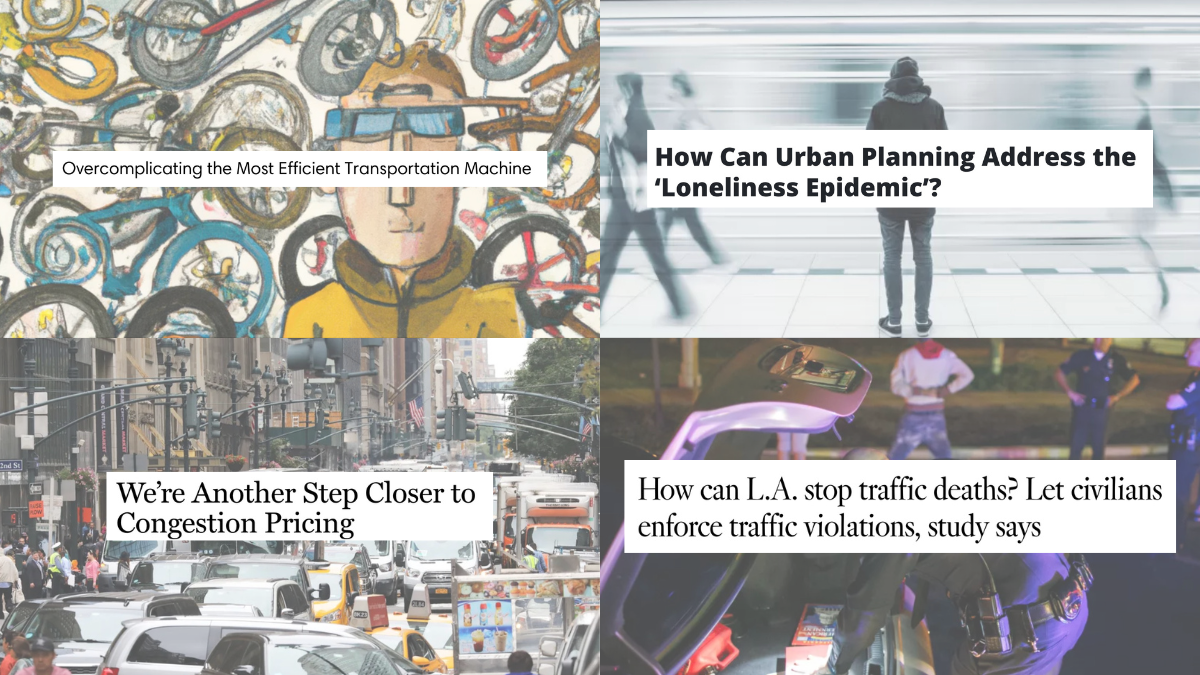
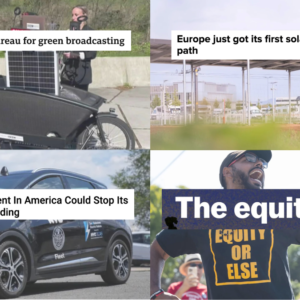
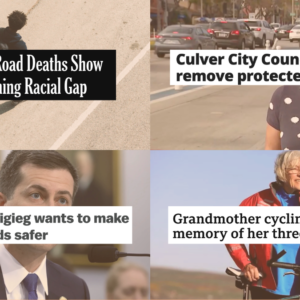
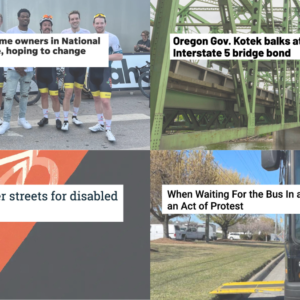
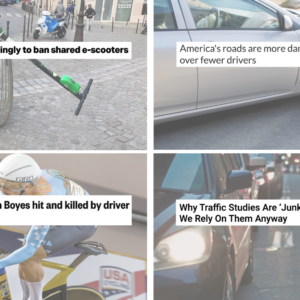
Thanks for reading.
BikePortland has served this community with independent community journalism since 2005. We rely on subscriptions from readers like you to survive. Your financial support is vital in keeping this valuable resource alive and well.
Please subscribe today to strengthen and expand our work.
From an article in the links of “We’re Another Step Closer to Congestion Pricing”
CONGESTION PRICING
AUG. 26, 2021
What It Will Take for Kathy Hochul to Get Congestion Pricing Right
“Policies may need to be established for essential workers that may have to drive but do not have the ability to shift their work schedules,”
What are the guarantees being built into the Oregon Congestion pricing that will prevent them from being a tax on blue collar workers? I haven’t seen any, has anyone seen anything concrete? For me it’s admittedly academic as I was gentrified out of Portland a few years ago, but my friends/coworkers are still there and facing this issue.
“What are the guarantees being built into the Oregon Congestion pricing that will prevent them from being a tax on blue collar workers?”
What’s the point of having a congestion tax if you subsidize a significant percentage of the people creating the congestion? You can’t keep punting every revenue-generating mechanism to people who make more than everyone else in traffic.
Just institute a wealth tax – and let’s see how that flies.
“What are the guarantees being built into the Oregon Congestion pricing that will prevent them from being a tax on blue collar workers?”
The straightforward thing to do imo is to issue a dividend to low-income households. Dedicate some portion of the revenue to a dividend, a portion to maintenance, and the rest to active transportation.
What is the point of Congestion tolling (CT from now on)? Is it to cut down on car trips by the working low income who can’t change their schedule and must travel at those times as they don’t have the extreme luxury of working from home? Is it the opportunity to raise money off of people who can’t avoid traveling at specific times so the government is drooling over the chance of getting guaranteed extra money from people who can’t avoid it and proclaim themselves self righteously to be doing something for the environment?
I’m not being rhetorical here, I honestly don’t know the incentive for CT to happen. I see a lot of posters here are for it as is seems to satisfactorily punish those for needing to drive at a certain time.
I understand that this is post rightly should be about bicycle commuting and for those that can I hope they will. When I was commuting across the Metro it took 4 hours roundtrip by train/bus/walk and 2 hours roundtrip by car at very specified times. Due to location and workload bicycling wasn’t possible for me, and its not possible for everyone.
If there are dividends for low income workers or some other form of avoidance, than why have CT to begin with since the majority of people won’t be paying CT.
Thats the problem with CT as I see it. If it comes to be than everyone should pay and it will be a tax on the working low income. I don’t think CT should come to pass as it will hurt individuals more than it will help the greater good.
Trying to do everything with “equity” in mind will drastically reduce the effectiveness of the policies. Sometimes equal application of a standard is the most effective method.
Thank you for noticing!
I’ll believe it when they actually try it and find that it works. Until then, it is not an evidence based solution.
No, it clearly makes a lot more sense to have civilians do this than police. As mentioned in the article, a few other decent sized cities are trying it, so there will be proof that you can disregard and stick to your guns about soon:
https://whyy.org/articles/philadelphia-public-safety-enforcement-officers-first-group/
It makes way more sense to have civilians do this kind of work despite the fantastical scenarios of a Sherlock Holmes (ironically a civilian) style cop discovering a human trafficking ring at a routine (probably pretextual) traffic stop.
I’ve read several of these optimistic stories of the beginnings of these programs and haven’t read anything regarding follow ups. Are there any out there or have the programs simply not been successful? Also, interesting to see the article about Danielle Outlaw and no mention of her time in Portland.
Well according to the link I pasted, the first public safety enforcement officers were sworn in two months ago, so they probably haven’t eliminated all traffic safety violations just yet. The other cities haven’t started yet as far as I could tell. Also the Philadelpha police department appears to have about 6500 cops, so adding 125 civilians for traffic enforcement feels a bit like a trial size anyway.
We will see, but I don’t see any scenario in which they would not be successful.
I don’t doubt the program will be successful, I just don’t think it’s doing what you claim it is.
Was cruising the news and saw an update on West Hollywood’s year long try with unarmed Security Ambassadors much like the Philadelphia attempt. It turned out to not go as the City Council hoped and they are rehiring the police the defunded to afford the Security Ambassadors.
https://abc7.com/west-hollywood-city-council-safety-crime/13254492/
West Hollywood council votes to add 4 LASD deputies in aftermath of high-profile crimes
Reactionary city council votes to side with local business owners, news at 11.
But seriously, that program isn’t remotely comparable to the Philadelphia (or any of the other mentioned) programs. That is talking about unarmed security people walking the streets (a good idea, btw), and the Philadelphia and others talked about here are about traffic enforcement.
Watts posted the statute of what the Philadelphia people will be doing. I don’t see traffic enforcement listed. The closest to even mentioning traffic enforcement is “providing support to the Police Department to regulate the flow of traffic;”
I’m truly curious now as to what kind of traffic enforcement other than writing tickets when the parking meter runs out you think they will be doing? Do you think they’ll be in a Public Safety car pulling people over?
Even if the most watered down interpretation of the Philly statute is what happens, it’s not the same thing that the Hollywood safety officers do. The Hollywood officers are explicitly meant to go around patrolling the streets for public safety. That’s not what the Philly program is even remotely designed to do, so the comparison doesn’t make any sense.
The story talks about these folks doing things like directing traffic and writing tickets, but the only tickets it describes are for things like abandoned autos. Those are the sort of tasks civilians already do in Portland, so it does not exactly point the way towards a different future for us.
What people talk about in this forum are unarmed officers pulling drivers over for moving violations, which is a completely different thing. You can call the dangers inherent in the job “fantastical” but that just shows a lack of understanding of the reality of the situation, which is well documented.
Those are two separate items listed. It takes some motivated reasoning to think that’s meant to be “tickets for abandoned vehicles”.
Sounds like writing tickets and doing traffic enforcement.
Sounds like something that would help the situation.
They’re not doing it all right now. Sounds like it’s mostly due to having to do battle with the police union, not because they’re not ready and planning to do traffic enforcement.
What is documented is armed cops provoking an armed response when their generally belligerent interactions with people turn out poorly.
Ticketing abandoned vehicles was described twice, and no other type of ticketing was even mentioned, so I’m not sure which way the motivated reasoning is flowing. I’d be happy to look at any citation showing they will be doing something of a higher degree of enforcement/human interaction than what we already do here, if you can find one. Yes, I’ll wait.
I don’t know how familiar you are with Philly, but that is not the first place I’d choose to roll out an experiment testing the feasibility of using unarmed officers to enforce moving violations.
If they can make civilian enforcement of moving violations work there, I’d support trying it here. If your characterization of the proposal is accurate (which I think it isn’t), and it proves successful (which I think it wouldn’t), you’ll have the potential of convincing me you’re right on this issue, in which case I’ll happily issue a public acknowledgement that “you told me so.”
Ok, well I don’t want to drag this out but I already pasted the citation, it’s that link you replied to earlier and that I pulled out a pile of quotes from. If you think they’re lying just say so, but the plan is they will be writing tickets and performing traffic enforcement and ordering abandoned vehicles removed. Those are different things. They didn’t write “writing tickets for abandoned vehicles”. This isn’t some word game puzzle, it’s very clear.
Yeah but you wouldn’t choose any place to “experiment” in testing this. You wouldn’t do it here, you wouldn’t do it there, you just don’t believe anyone other than armed cops for some strange reason are capable of writing a speeding ticket.
It might not pan out that it works as described, but what they’re saying is that these civilians will be doing traffic enforcement.
You did, and the story never mentioned work like writing speeding tickets, only the sorts of things non-cops routinely do here. I don’t think they’re lying; I think they’re going to do exactly what the article described. I think you’re overinterpreting it because you want to prove a point.
But rather than continue to argue over the choice of phrases in a news story, how about we look at the enabling statute itself, which lists directing traffic, enforcing neighborhood quality of life provisions, and other related duties.
None of which sounds like writing speeding tickets or anything else remotely related to traffic enforcement.
https://codelibrary.amlegal.com/codes/philadelphia/latest/philadelphia_pa/0-0-0-264879
It does appear that the WHYY article is pretty misleading. The law sounds pretty vague, like they could be writing traffic tickets, but that isn’t made explicit. Too bad, seems like a missed opportunity.
I listened to this over the weekend. It was a good story (though not a ton of new material for those versed in the topic), but the author repeated the fashionable myth that if a developer can save money building, the rent will be lower.
It won’t be.
It’s kinda mind blowing how the author of the loneliness article comes close but won’t mention WFH as a factor in the surge of feelings of isolation. But sure, it’s all just a decline in church attendance and social media. And the built environment is obviously a huge factor at play right now, yeah, definitely. Staying at home and working from the basement or spare room? Maybe not interacting with another person in the flesh at all in a day? Nah, that’s totally cool!
But you never have to leave your house! No commute! What could possibly go wrong?
Sadly, in Uhmehrka suggesting that someone reduce their GHG-spewing and ecocidal consumption is viewed as some sort of taboo guilt trip that would extinguish any support for decarbonization. And perhaps this is true.
This reluctance to live in a manner consistent with sustainability is why I can’t stand the climate movement in the USA. On the one hand they plant gardens blocking oil trains and on the other they drive their GHG and air toxic-spewing cars to some random protest while bragging about eating prime rib on instagram. As far as I can tell, the climate movement in the USA is a feel good movement that seeks minor victories to give people some sense of “doing something” while our ecocidal system churns away and continues to macerate people who live in designated sacrifice zones.
PS: People living in the PNW are remarkably insulated from the climate crisis so this is not about you at all. It’s about whether you have compassion for the countless people who will suffer because you drove your SUV to slurp up the beef pho you advertise to the masses on social media.
Driving a car considerable distances for what is called activism is a thing. People go 15 miles, or 500, in a car because it’s average behavior here, our choices in travel are constrained, and maybe their flavor of activism is not about the environment so the car is how they do it.
There’s no similar link between activism and the conspicuous consumption of beef. There are definitely people much more concerned about what they eat than where their car exhaust goes, or where their fuel dollars go.
I don’t care whether activists drive hummers and eat steak for breakfast, lunch, and dinner. People’s personal behaviors have essentially no impact on the climate crisis. However, communicating a vision of a more sustainable future to others is critically important. Having so called climate leaders promoting SUV use or meat consumption on social media provides a bleak vision of our future.
I’m not sure this is a thing, but perhaps it has happened. I would see this as more of a personal failing/contradiction than a condemnation of climate activism in general.
It happens constantly, Watts. The climate movement has gone from “SUVs cause global warming” to don’t shame people for driving an SUV — they are victims of capitalism.
“Not shaming” is different than promoting. I have mixed feelings about the shaming question, but I have pretty clear feelings on promoting.
“According to the European clean transport campaign group Transport and Environment, a private jet can emit two tonnes of carbon dioxide in an hour and is five to 14 times more polluting per passenger than a commercial plane.”
Is it a personal failing when the COP events are at luxury resorts and attended by our betters abusing the environment with such gusto? Or is it evidence that those betters don’t really believe in the problem?
Thunberg made this point incisively by refusing to attend overseas meetings until she was able to cross the atlantic on low-carbon sail boats. This “stubbornness” had nothing to do with optimization of her personal carbon footprint and everything with communicating the importance of collective changes to our ecocidal status quo. To be blunt, the american climate movement is often hostile to the idea that we should prefiguratively politicize the ecocidal status quo. The climate crisis is causes by 100 capitalist oil companies* and we collectively have absolutely no agency (so should feel no guilt, ever).
*most of whose production are state owned
I think you summarized things nicely.
Everyone is a hypocrite on some level, an nothing an individual does will compare to the impacts that an industry has.
My own opinion is that climate change is inevitable. Humans as a species are too focused on immediate survival and pleasure. It’s more in our nature to adapt than prevent.
I reluctantly agree with your bleak view of the likely outcome. But it’s easy to be blasé about it from a place that’s not going to be an immediate casualty of famine and water wars (probably). Millions of people aren’t going to be able to adapt.
Getting a 404 on the Intercept article. Is it this one: https://theintercept.com/2023/05/08/energy-transition-utilities-consumption/